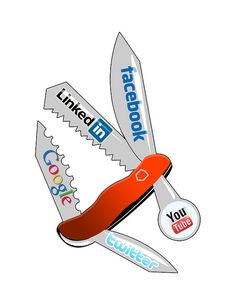Social media has allowed everyone an opportunity to share information with the rest of the world. This has resulted in the acceleration of news and the area of exposure.
“Every online movement leaves cyber footprints that are rapidly becoming fodder for research without you ever realising it” – Sharon, J. (2014)
Be it a racist remark, a complaint about work or a teasing photo of a stranger, can be easily shared among thousands of people before one realised. This may cause a piece of information to go viral and lead to undesirable consequences to the parties involved.
Hiding behind a screen has encouraged individuals to speak freely, however this has resulted in many to forget about digital ethics.

Source: Pinterest
However, with so many digital ethics, which is the significant one that schools or businesses must take note of?
In my personal opinion, it will be issues about deception.
What is digital deception?
This is an act of deceiving another party deliberately or manipulating information to create a false perception.
So, how does digital deception works?
The rise of social media has resulted in many organisations to participate and utilise social medias to create their brand presence. For example, companies or bloggers can create deceiving images of its popularity on social media through ‘buying followers’. This may be a short-term strategy to gain popularity, however it may affects their credibility (Dailymail UK, 2014).

Source: Buzzoid
By creating a false image of the company’s popularity, they may be able to see a spike in its followers. A business owner had admitted that he bought followers during the start-up of this company and saw a drastic increase, however this did not last (Chris, 2013).
Video created by me – shows the story of Chriss Dessi
Apart from businesses, there are also famous individuals who buy their followers, like comedian Dan Nainan.

Source: NY Times
Nainan mentioned that he bought followers to create an image of “oh this guy has so many followers, he must be famous” which, in turn, helps him to gain “real” followers (Austin, 2012). This is an act of deceiving.
The value of the advertisements that a company will pay the bloggers is based on the number of followers (Cornal, 2012). Therefore, by buying followers, bloggers may actually be earning more money as opposed to the rightful amount.

Source: Business News Daily
There are a lot of cyber ethics that people should always take note before they comment or post anything online. However, by generating a deceptive image may leads to the lost of credibility, damaging reputation or face harsh criticisms from the public. All these may cause the creator to have a traumatic experience.

Image created by me
With the rise of unethical cyber acts, precautions should be made! (watch the following video for some tips)
(word count: 403)
References
Sharon, J. (2014). Social media research raises privacy and ethics issues. [Online] Available at: http://www.usatoday.com/story/news/nation/2014/03/08/data-online-behavior-research/5781447/ [Accessed on 11 November 2016]
Margot, P. (2014). Is BUYING social media followers the secret to online popularity? The hush-hush services that grow your presence – but may well ruin your credibility. [Online] Available at: http://www.dailymail.co.uk/femail/article-2756681/Is-BUYING-social-media-followers-secret-online-popularity-The-hush-hush-services-grow-presence-ruin-credibility.html [Accessed on 11 November 2016]
Chris, D. (2013). A confession: I bought 50,000 Twitter Followers. [Online] Available at: http://www.socialmediatoday.com/content/confession-i-bought-50000-twitter-followers [Accessed on 11 November 2016]
Austin, C. (2012). Buying their way to Twitter Fame. [Online] Available at: http://www.nytimes.com/2012/08/23/fashion/twitter-followers-for-sale.html?_r=0 [Accessed on 11 November 2016]
Cornal, U. (2012). How many Twitter followers do they really have? [Online] Available at: https://www.theguardian.com/technology/2012/aug/26/how-many-twitter-followers-do-they-really-have [Accessed on 11 November 2016]

One comment